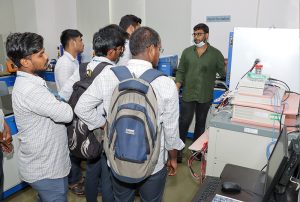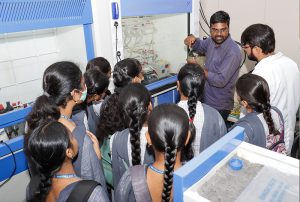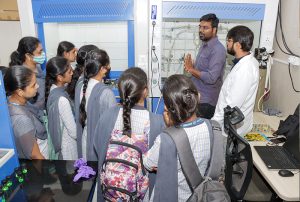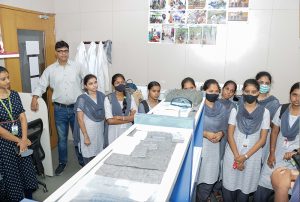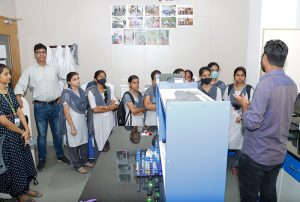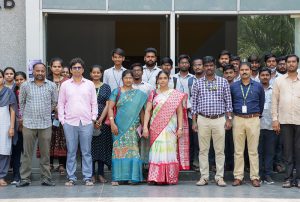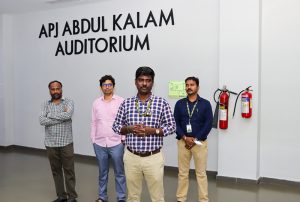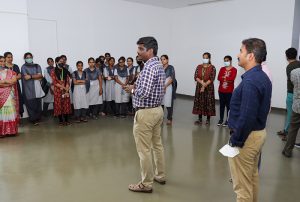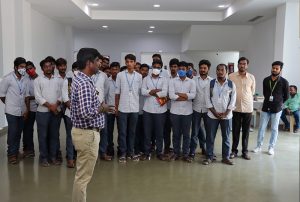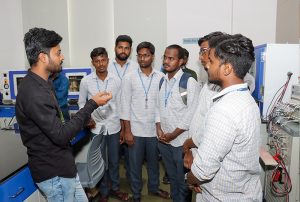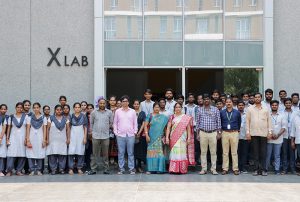- Inspiring the world with quality research facilities May 7, 2022
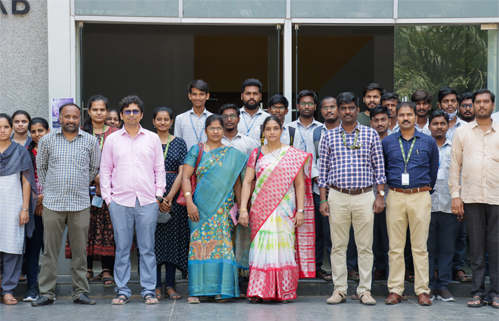 SRM AP is known for its resources and facilities for pioneering research with the support of global leaders and SME’s while sticking to compliance and international regulations. Obtaining research excellence in every field of study has been a mission of the university. Recently, 50 MSc students from the Department of Chemistry, KBN College, Vijayawada, visited our university to explore the analytical and research facilities available here.
SRM AP is known for its resources and facilities for pioneering research with the support of global leaders and SME’s while sticking to compliance and international regulations. Obtaining research excellence in every field of study has been a mission of the university. Recently, 50 MSc students from the Department of Chemistry, KBN College, Vijayawada, visited our university to explore the analytical and research facilities available here. The research areas handled by the Department of Chemistry of SRM AP include the disciplines of chemical sciences, ranging from organic, inorganic, and physical, to theoretical or computational chemistry. The department’s highly disciplinary and collaborative environment is indeed inspiring, and it continues to grab attention. The strong interactions of the university with other premier institutions across India and around the world refine the quality of analytical and research facilities available here. The students from KBN college eagerly interacted with the faculty members and research scholars. Dr Mahesh Kumar Ravva and Dr Rajapandiyan, Faculty members, coordinated the visit.
Continue reading → - Dr A T Biju unveils the mystery of Organocatalysis September 3, 2021
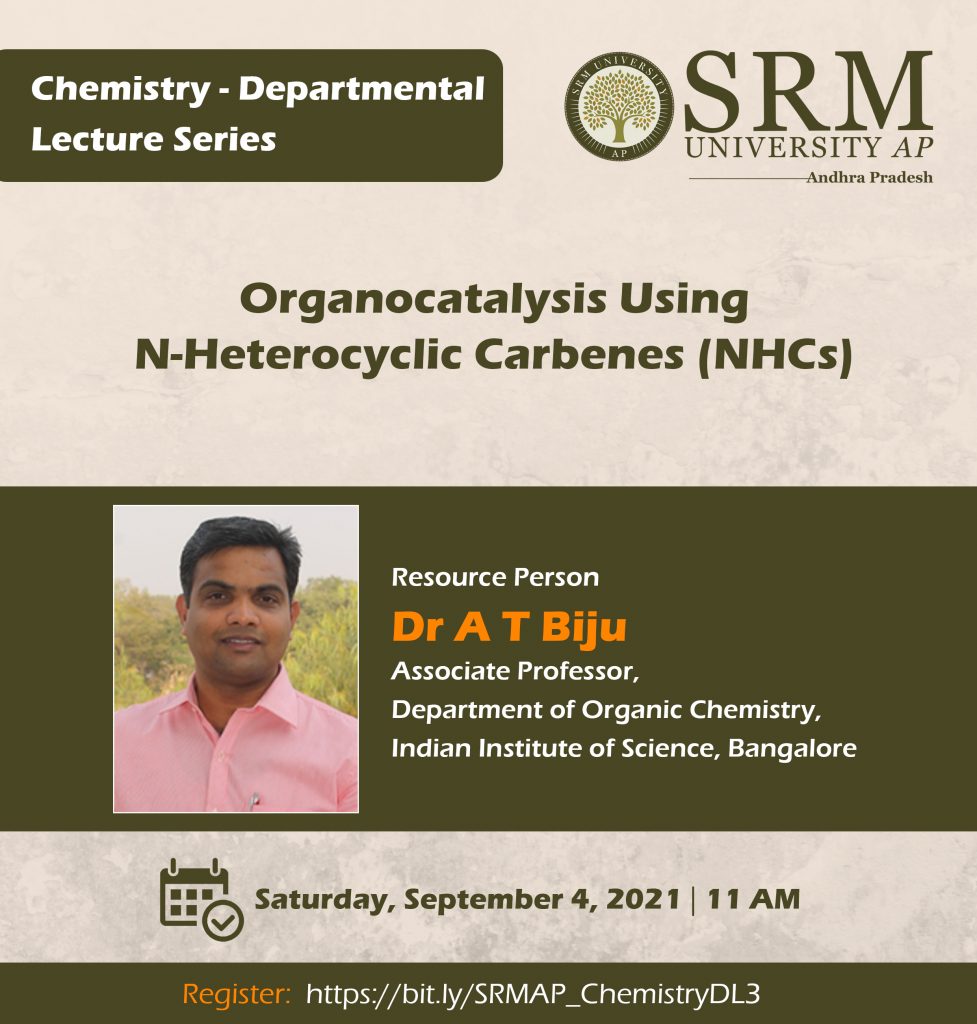 Chemistry Departmental Lecture Series brings another captivating webinar on “Organocatalysis Using N-Heterocyclic Carbenes (NHCs)”. Dr A T Biju, Associate Professor, Department of Organic Chemistry, Indian Institute of Science, Bengaluru, will deliver the keynote address on Saturday, September 04, 2021, at 11 am.
Chemistry Departmental Lecture Series brings another captivating webinar on “Organocatalysis Using N-Heterocyclic Carbenes (NHCs)”. Dr A T Biju, Associate Professor, Department of Organic Chemistry, Indian Institute of Science, Bengaluru, will deliver the keynote address on Saturday, September 04, 2021, at 11 am.Abstract
Catalysis is a fundamentally sustainable process, which can be used to produce a wide range of chemicals and their intermediates. Among the various catalytic methods, N-heterocyclic carbene (NHC)-catalyzed umpolung of aldehydes is widely used for unconventional access to target molecules. Moreover, NHC-catalysis is known for umpolung of Michael acceptors, but imine umpolung was unknown in this realm of catalysis. In this context, Dr Biju and his team have demonstrated, for the first time, the NHC-catalyzed umpolung of imines for the synthesis of 2,3-disubstituted indoles, functionalized quinolines and dihydroquinoxalines. In addition, NHC-catalysis is widely used for the generation of α,β-unsaturated acylazoliums, followed by their interception with various nucleophiles, the formal [3+3] annulation reactions. In this area, recently Dr Biju and his team have reported the enantioselective NHC-catalyzed annulation reactions for the synthesis of dihydropyranones, dihydropyridinones, cyclopentenes, pyrazoles, spirocyclohexadienones, tricyclic δ-lactones, tetracyclic indoles etc., where NHC-bound α,β-unsaturated acylazoliums are the key intermediates. Very recently, Dr Biju employed the umpolung of aldehydes for the synthesis of axially chiral C-N bond-containing molecules. The keynote address will shed further light on this.
About the speaker
Dr A T Biju received his M Sc from Sacred Heart College Thevara (affiliated to MG University, Kerala, India) and PhD from CSIR-NIIST (Formerly RRL), Trivandrum, India. After that, he worked as a post-doctoral fellow with Prof. Tien-Yau Luh at the National Taiwan University, Taipei. He has also worked as an Alexander von Humboldt fellow with Prof. Frank Glorius at the Westfälische Wilhelms-Universität Münster, Germany. In June 2011, he began his independent research career at the CSIR-National Chemical Laboratory, Pune. He became an Associate Professor at the Department of Organic Chemistry, Indian Institute of Science, Bengaluru, in June 2017. His research focuses on the development of transition-metal-free carbon-carbon and carbon-heteroatom bond-forming reactions using aryne chemistry and N-heterocyclic carbene (NHC) organocatalysis and their application in organic synthesis.
Chemistry enthusiasts are welcomed to avail the opportunity to listen to him on Saturday, September 04, 2021, at 11 am. Register now.
Continue reading → - Cost-effective high-end research instrumentation and materials in India August 3, 2021
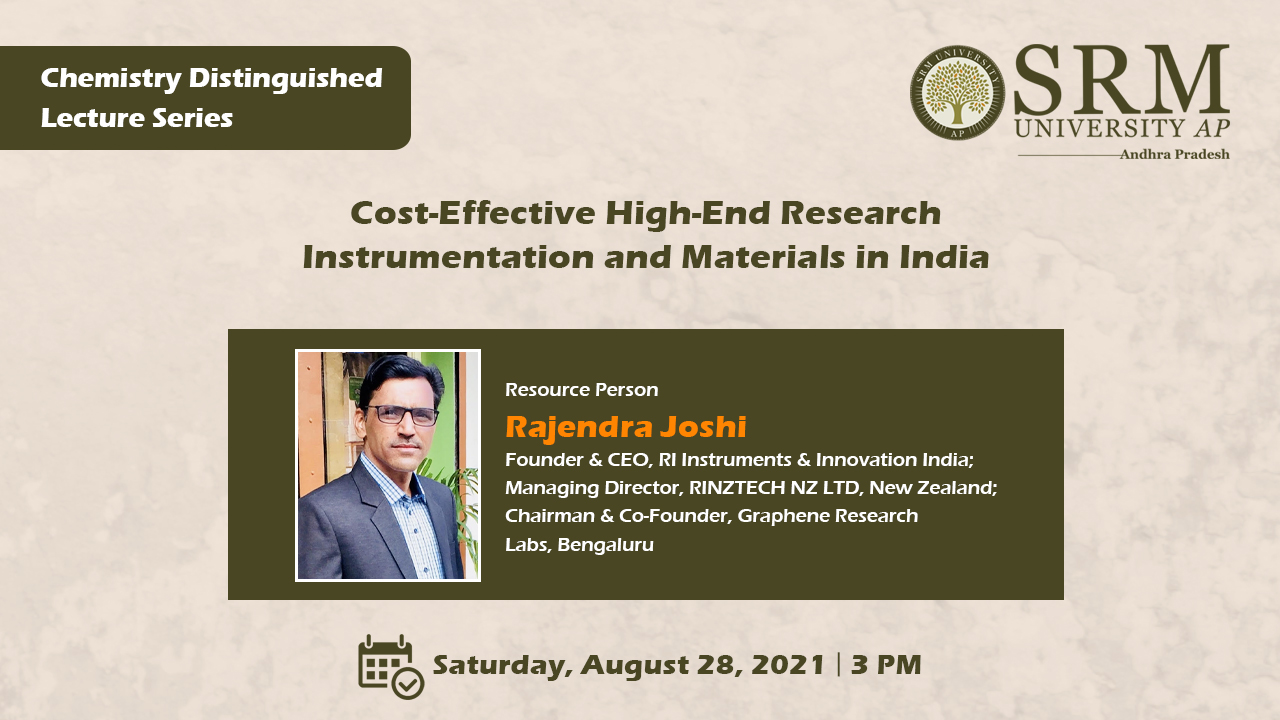 The Department of Chemistry is organising the second episode of the Department Lecture Series on August 28, 2021, at 03.00 pm. Dr Rajendra Joshi, Chairman of RI Group, will deliver a lecture on the topic “Cost-effective high-end research instrumentation and materials in India”.
The Department of Chemistry is organising the second episode of the Department Lecture Series on August 28, 2021, at 03.00 pm. Dr Rajendra Joshi, Chairman of RI Group, will deliver a lecture on the topic “Cost-effective high-end research instrumentation and materials in India”.Indigenous development of upper end scientific analytical instruments in India has always been a big challenge. RI Instruments & Innovation India has proved that with cohesive teamwork, this is very much possible. The group has designed Raman Spectrometer, RIUS (Universal Spectroscopy), RIMS (Modular spectroscopic work station) XRD, TEM (Under Trial), Class AAA Solar simulator, the world’s smallest USB microscope and a few more.
About the speaker:
Dr Rajendra Joshi is the recipient of the National Innovation Award for the year 2019 by the Ministry of Chemicals and Fertilizer, Govt. of India for the innovation of Graphene Oxide / Li based rechargeable batteries with replaceable electrodes. As an Instrumentation Professional and Material’s Physicist, he started his career at National Physical Laboratory, New Delhi in the year 1997 – 1998. He has certification in Quality Control/R&D Professional training from Japan, Germany, France, Italy and UK. Cost-effective solar simulator, Indian designed drone for societal applications, Graphene Oxide-based rechargeable battery with replaceable electrodes etc are some of his major achievements.
To know more about the cost-effective high-end research instrumentation and materials in India, join this webinar on August 28, 2021, at 03.00 pm.
Register here:https://srmap.zoom.us/webinar/register/WN_TFkeKpn2TWSwfm2qdpYpGw
Continue reading → - Prof Arunan to usher into the advancement of Molecular Beam Microwave Spectroscopy May 6, 2021
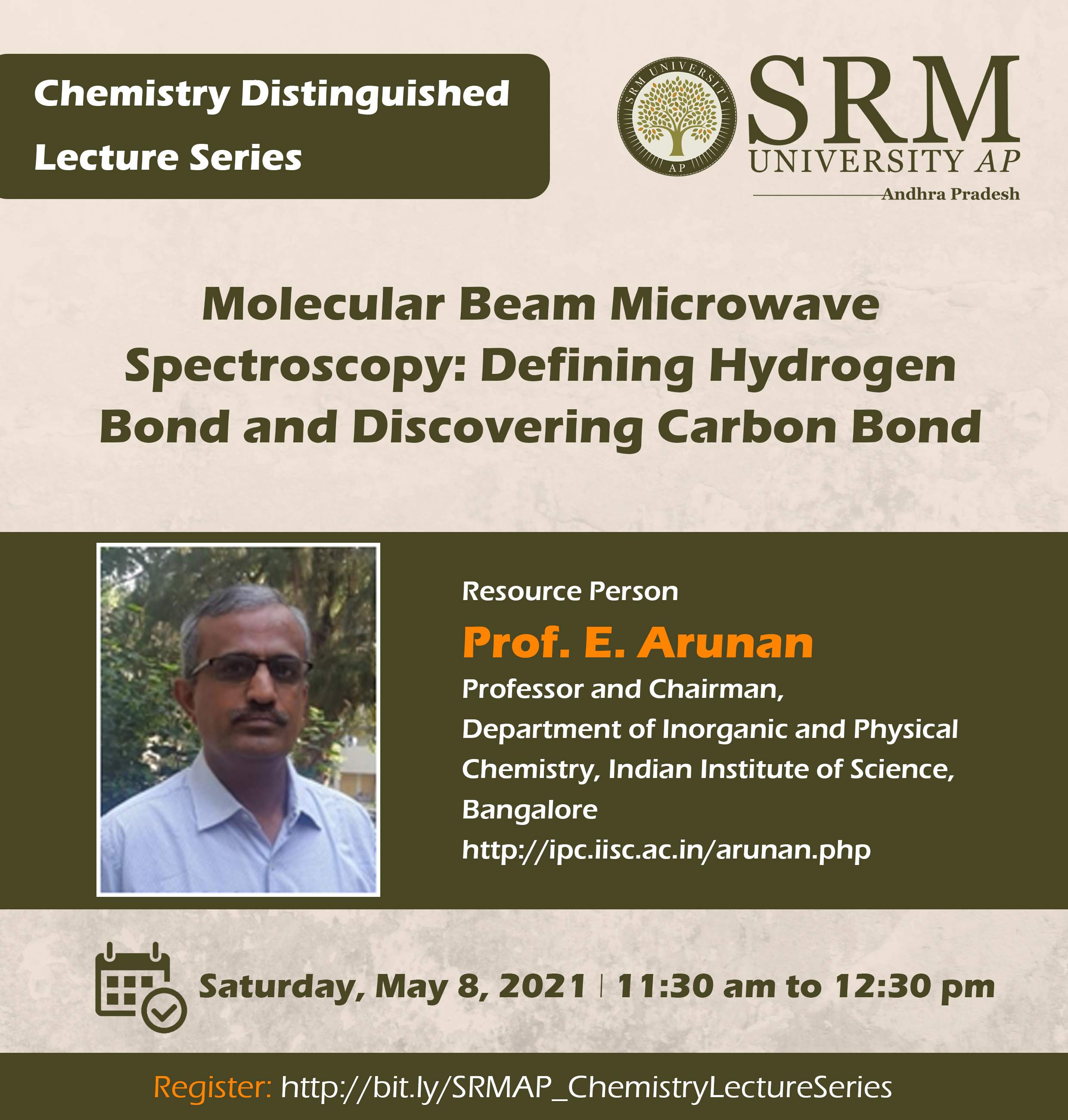 The Chemistry Distinguished Lectures series starts its voyage towards transcendental knowledge with an exciting discussion on “Molecular Beam Microwave Spectroscopy: Defining Hydrogen Bond and Discovering Carbon Bond” on May 8, 2021, at 11.30 am. Renowned scientist and Professor E Arunan from the Department of Inorganic and Physical Chemistry, Indian Institute of Science (IISc), Bangalore, will join the webinar as the Keynote Speaker.
The Chemistry Distinguished Lectures series starts its voyage towards transcendental knowledge with an exciting discussion on “Molecular Beam Microwave Spectroscopy: Defining Hydrogen Bond and Discovering Carbon Bond” on May 8, 2021, at 11.30 am. Renowned scientist and Professor E Arunan from the Department of Inorganic and Physical Chemistry, Indian Institute of Science (IISc), Bangalore, will join the webinar as the Keynote Speaker.Professor Arunan has extensive research experience in the field of Chemical Sciences and is long associated with IISc, Bangalore, one of the premier institutes of India. Dr Arunan pursued his undergraduate studies at The American College, Madurai, followed by two masters from IIT Madras and IIT Delhi. He obtained his doctoral degree from Kansas State University, USA. Prior to becoming an academician, he worked as a Post-Doctoral Scholar at the University of Illinois at Urbana-Champaign. Prof Arunan started his career as an Assistant Professor at the Department of Chemistry, IIT-Kanpur in 1995. He later moved to the Department of Inorganic and Physical Chemistry, IISc, Bangalore and became a Professor in 2009 and Chairman in 2018.
Prof Arunan’s research interests include experimental physical chemistry, molecular and van der Waals spectroscopy, chemical kinetics and dynamics, hydrogen bonding and other intermolecular bonds/interactions, shock wave interactions with molecules and materials, astrophysics/astrochemistry. He has published around 100 papers in peer-reviewed international Journals, 14 in International Conference Proceedings, 8 in Resonance, the Journal of Education and 16 in Current Science, published by the Indian Academy of Sciences. The celebrated personality has given numerous plenary, keynote and invited lectures all over India and many countries in the world, including the USA, UK, France, Germany, Italy, Poland, Spain, Portugal, Hungary, Finland, Russia, Australia, Czech Republic, China, Pakistan, Bangladesh, Singapore and South Korea. He has delivered inspiring talks at most of the premier institutes in India and also in colleges and high schools all over India.
Prof Arunan is a Fellow of International Union of Pure and Applied Chemistry, Indian Academy of Sciences and a member of the International Advisory Board for ‘Horizons in Hydrogen Bond Research” Conference 2011, International Advisory Board for the Asian Spectroscopy Conference 2009-2013, Programme Advisory Committee on Physical Chemistry, Department of Science and Technology 2008-2012, International Advisory Editorial Board for Physical Chemistry Chemical Physics, Royal Society Publication, From 2005 and many other organisations and advisory boards. Further, he is serving the scientific community as the Section Editor (Chemistry) for Current Science from 2018, Associate Editor from 2013, Associate Editor for Journal of Chemical Sciences from 2012-2016.
Prof Arunan’s contributions to the world of Chemical Sciences has been acknowledged with many awards and accolades. He was the recipient of the Chemical Research Society of India Bronze Medal 2008. He is also the Founder Member cum Vice-President of the Indian Society for Shockwave Research.
Chemistry enthusiasts are encouraged to join the webinar to learn more on the Molecular Beam Microwave Spectroscopy from the expert himself on May 8, 2021, at 11.30 am.
Register: http://bit.ly/SRMAP_ChemistryLectureSeries
Continue reading →
1. Guest lecture by Prof. Prasad V Bharatam, Department of Medicinal Chemistry, from NIPER, Mohali<.p>
Title of the Talk: New concepts in chemical bonding
Date : 25-01-2020
Venue: Tiered Classroom, 5th floor, 4.15 pm
2. Guest lecture by Dr. Prakash Sista, Senior Scientist at SABIC, USA
Title of the Talk: Molecules to Devices – The Role of Chemistry in Modern Technological Advances
Date: 19th July, 2019
Venue: Tiered Classroom, 5th floor, 4.15 pm


